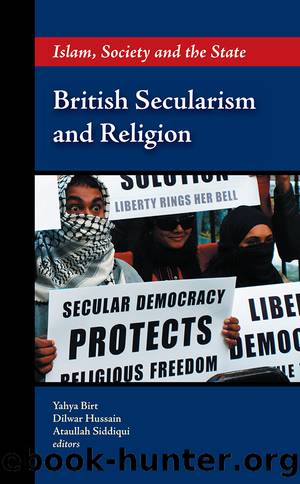British Secularism and Religion by Yahya Birt & Dilwar Hussain & Ataullah Siddiqui

Author:Yahya Birt & Dilwar Hussain & Ataullah Siddiqui
Language: eng
Format: epub
Publisher: Kube Publishing Ltd
Part II
Political Perspectives
Chapter 5
Civic Recognition and Respect for Religion in Britainâs Moderate Secularism1
Tariq Modood
One of the features of the âcultural turnâ in social studies and of identity politics is that, while many think one or both may have gone too far, it is now commonplace that the classical liberal separation of culture and politics or the positivist-materialist distinctions between social structure and culture are mistaken. Yet religion â usually considered by social scientists to be an aspect of culture â continues to be uniquely held by some to be an aspect of social life that must be kept separate from at least the state, maybe from politics in general and perhaps even from public affairs at large, including the conversations that citizens have amongst themselves about their society. This religionâpolitics separationist view, which is clearly normative rather than scientific, can take quite different forms, either as an idea or as practice and can be more or less restrictive, I shall call âsecularismâ. While acknowledging the variety of forms it can take I want to argue that one of the most important distinctions we need to make is between moderate and radical secularism. The failure to make this distinction is not just bad theory or bad social science but can lead to prejudicial, intolerant and exclusionary politics. I am particularly concerned with the prejudice and exclusion in relation to recently settled Muslims in Britain and the rest of Western Europe but the points I wish to make have much more general application.
The chapter has three parts. Firstly, I argue at an abstract level that it does not make sense to insist on absolute separation, though of course itâs a possible interpretation of secularism. Secondly, radical separation does not make sense in terms of historical actuality and contemporary adjustments. This includes a consideration of how British Muslims operate more widely within the sphere of modern democratic identity politics. Thirdly, given that secularism does not necessarily mean the absence of stateâreligion connections, I explore five possible reasons for the state to be interested in religion.
Radical and moderate secularism
If secularism is a doctrine of separation then we need to distinguish between modes of separation. Two modes of activity are separate when they have no connection with each other (absolute separation); but activities can still be distinct from each other even though there may be points of overlap (relative separation). The person who denies politics and religion are absolutely separate can still allow for relative separation. For example, in contemporary Islam there are ideological arguments for the absolute subordination of politics to religious leaders, as say propounded by the Ayatollah Khomeini in his concept of vilayat-i-faqih (governance of the jurist), but this is by no means a consensus among the different schools of Islamic thought. Historically, Islam has been given a certain official status and pre-eminence in states in which Muslims ruled (just as Christianity or a particular Christian denomination had pre-eminence where Christians ruled). In these states Islam was the basis of state ceremonials
Download
This site does not store any files on its server. We only index and link to content provided by other sites. Please contact the content providers to delete copyright contents if any and email us, we'll remove relevant links or contents immediately.
| Africa | Americas |
| Arctic & Antarctica | Asia |
| Australia & Oceania | Europe |
| Middle East | Russia |
| United States | World |
| Ancient Civilizations | Military |
| Historical Study & Educational Resources |
Cecilia; Or, Memoirs of an Heiress — Volume 1 by Fanny Burney(32536)
Cecilia; Or, Memoirs of an Heiress — Volume 2 by Fanny Burney(31934)
Cecilia; Or, Memoirs of an Heiress — Volume 3 by Fanny Burney(31925)
The Secret History by Donna Tartt(19023)
Sapiens: A Brief History of Humankind by Yuval Noah Harari(14356)
Leonardo da Vinci by Walter Isaacson(13304)
The Radium Girls by Kate Moore(12011)
Sapiens by Yuval Noah Harari(5361)
How Democracies Die by Steven Levitsky & Daniel Ziblatt(5209)
The Wind in My Hair by Masih Alinejad(5085)
Homo Deus: A Brief History of Tomorrow by Yuval Noah Harari(4896)
Endurance: Shackleton's Incredible Voyage by Alfred Lansing(4749)
Man's Search for Meaning by Viktor Frankl(4567)
The Silk Roads by Peter Frankopan(4522)
Millionaire: The Philanderer, Gambler, and Duelist Who Invented Modern Finance by Janet Gleeson(4457)
The Rape of Nanking by Iris Chang(4194)
Joan of Arc by Mary Gordon(4091)
The Motorcycle Diaries by Ernesto Che Guevara(4081)
Stalin by Stephen Kotkin(3950)
